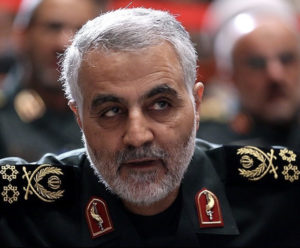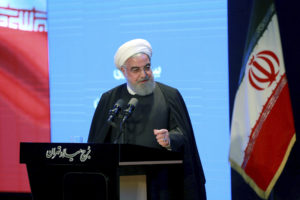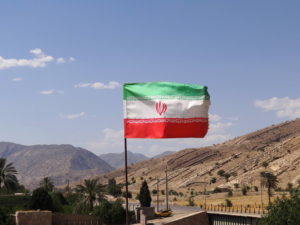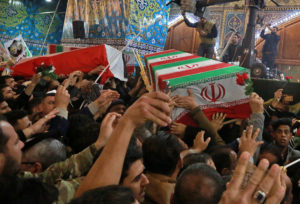A Better Iraq? That’s What Saddam Said
The war is over for now in Sahar al-Jawari's Baghdad neighborhood, but life is still a struggle. An American soldier encourages her not to be pessimistic, but it's hard to look on the bright side while supporting a family by selling off your jewelry.
BAGHDAD — The war is over on Sixth Street, where Sahar al-Jawari’s family lives in a modest brick house. Dust has filled the shrapnel holes in concrete fences, stagnant water has pooled in the crater left by a roadside bomb, and the ash and the few charred chunks of the Iraqi police car that the bomb blew up are barely visible on the sidewalk.
But Jawari, 33, has little faith that her life is about to improve. Every night the wind carries the sounds of gunshots and occasional explosions from other parts of Baghdad, where the war still goes on. Every day is a struggle to get by in a city that gets only four hours of power and running water a day. Jawari is divorced and unemployed, but Iraq’s weak government gives her no financial aid. Nor does it make her deadbeat ex-husband pay child support to help raise her 12-year-old daughter, Roula.
“We have no money, no electricity, no water, no security, no future, nothing,” Jawari says. “Maybe in 50 years it will get better.”
Many Iraqis in this part of southwestern Baghdad say the same thing. They have little hope for help from a government that has been unable to deliver even the most basic services, and little faith in the Iraqi security forces, tainted by their past association with sectarian militias and infamous for defecting under fire.
And although American forces have effectively established security in the streets here, every time residents go outside, bomb craters, bullet holes and buildings damaged by explosions remind them of the sectarian violence that raged here less than a year ago.
Sahar and Roula live with Sahar’s mother, Salimah, and her two nieces, Basmah, 16, and Thohara, 14. The girls’ mother, Jawari’s sister, died of kidney disease 12 years ago: Because of the United Nations’ sanctions and mismanagement by the dictatorial government of Saddam Hussein, Baghdad’s hospitals did not have the proper medicine to treat her, and the family could not afford to send her abroad for surgery. The girls’ father, an engineer, died last year of a heart attack.
“He could not bear what we are suffering in Iraq,” Jawari says.
On a recent afternoon, the women and girls gathered in the kitchen to listen to Jawari’s aunt, Nuriyah, who lives in Denmark and came to Baghdad to visit her family. Nuriyah immigrated to Denmark 10 years ago.
“Over there, we live in heaven,” Nuriyah told them. “All the people there are good. They help everyone, even Iraqis. They send me a social worker to clean my house once a week. They give me health insurance. And every 14 days a nurse comes and gives me my medicine — for asthma, for high sugar content in my blood, for cholesterol and high blood pressure.”
Jawari shook her head.
“They take care of them as though they were little children,” she said. “I want to go to Denmark, any place, just to leave Iraq. What is here for me?”
“That’s a pretty pessimistic view. Iraq is going to get better,” interjected U.S. Army Lt. Rusty Mason, whose platoon was patrolling Sixth Street that day and who stopped by Jawari’s house.
“People are giving their lives to improve the life here: American soldiers, other soldiers,” said Mason. Four soldiers from his platoon were killed not far from Sixth Street in March when an explosively formed projectile, one of the devices that U.S. forces say are supplied to Iraq’s sectarian militias by Iran, pierced the armor of their Bradley fighting vehicle. “Iraqis are giving their lives.”
“We saw nothing good,” Jawari shot back.
Her family fled the violence that engulfed Sixth Street last summer, when Sunni and Shiite militias battled each other in the streets of this neighborhood, Saidiyah. The women stayed with relatives in another part of Baghdad, and when they returned, they found their door broken and their computer and television missing.
The government said it would give all returning refugees a one-time payment of approximately $900 to help them resettle in their homes. But in Saidiyah, where almost 400 families have returned since February, only 285 have received the money, said Lt. Col. Johnnie Johnson, whose 4-64th Armor Battalion of the 4th Brigade, 3rd Infantry Division, patrols the area. Jawari’s family was not among them.
The family depends on the government-issued ration cards, which all Baghdad residents receive to buy heavily subsidized rice, flour, oil, sugar and chickpeas. To pay for electricity, clothes and the rare treats of meat or fried fish — once every month or two — Jawari and her mother have been selling their jewelry. They also sold a plot of land they had owned in the country. Even on a diet of rice, eggs and pasta, the family spends between $250 and $400 a month.
Mason tried words of encouragement.
“Things will get better,” he said. “The security is already better. Hopefully, soon the power will get better in all of Iraq.”
Jawari shrugged.
“Under Saddam Hussein, that’s what they used to tell us, too: This will get better, that will get better, the power will get better. And — nothing,” she said, showing Mason the empty palms of her hands. Then she added, in English, for emphasis: “Never.”
Your support matters…Independent journalism is under threat and overshadowed by heavily funded mainstream media.
You can help level the playing field. Become a member.
Your tax-deductible contribution keeps us digging beneath the headlines to give you thought-provoking, investigative reporting and analysis that unearths what's really happening- without compromise.
Give today to support our courageous, independent journalists.






You need to be a supporter to comment.
There are currently no responses to this article.
Be the first to respond.